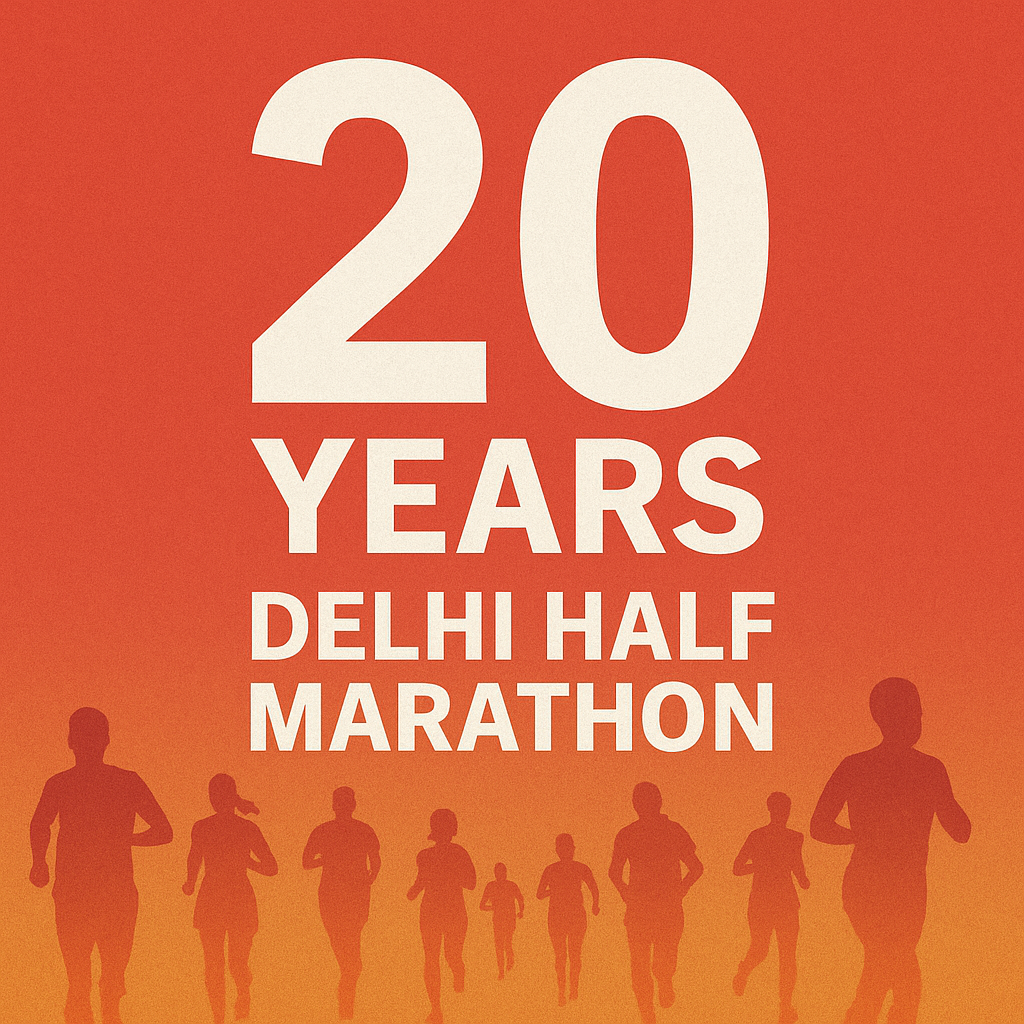The Delhi Half Marathon (DHM) marked its 20th edition this year — a milestone that not only celebrates athletic endurance but also two decades of shaping the city’s fitness culture and philanthropic spirit. What started in 2005 as a bold initiative to promote health and sports has evolved into one of India’s most iconic road-running events.
How It All Began: The First Step in 2005
Back in 2005, the idea of thousands running through the streets of Delhi was met with both excitement and skepticism. But the inaugural event, backed by corporate sponsors and civic enthusiasm, laid a strong foundation. Organized by Procam International, the event quickly gained international recognition for its professional execution, certified course, and inclusive vision.
“Few events have had the kind of ripple effect on urban lifestyle that DHM has,” said a senior member of Procam. “We weren’t just organizing a race — we were creating a culture.”
A Movement That Grew With the City
Over the years, more than 550,000 runners have participated in the Delhi Half Marathon across various formats — from elite 21K runners to casual 5K participants. Its course has witnessed Olympic champions, barefoot joggers, CEOs, and schoolchildren all running for different reasons — health, hope, and often, humanity.
The race has become synonymous with Delhi’s transition into a more fitness-aware metropolis. From sprouting new running groups in NCR parks to inspiring neighborhood fitness initiatives, the marathon’s impact runs deeper than its route.
₹54 Crore and Counting: Running for a Cause
One of the most remarkable outcomes of DHM has been its charity fundraising impact. Over 20 years, the marathon has helped raise ₹54 crore for over 400 NGOs, according to the India Cares Foundation, its philanthropy partner.
In 2023 alone, DHM helped mobilize ₹3.7 crore in funds across 27 NGOs and 40 corporate donors. Causes ranged from child education and mental health to disability rights and women’s safety.
“Corporate India sees this as more than a PR exercise. It’s a meaningful platform to give back — with both legs and wallets,” said an NGO fundraiser who’s been involved since 2010.
Going Beyond the Finish Line: Environmental and Social Inclusion
DHM has also set benchmarks for sustainable event practices. The organizers introduced eco-friendly hydration solutions, carbon offset initiatives, and improved waste segregation at race venues. In recent years, the marathon has also focused on gender inclusivity and accessibility, adding para-categories and encouraging participation from underserved groups.
International Attention, Local Pride
Globally recognized by World Athletics, the Delhi Half Marathon continues to draw elite runners from across the world. Kenyan and Ethiopian athletes regularly dominate the leaderboards, but the event’s heart lies in its local turnout.
This year’s race is expected to host 35,000+ runners, with a strong push on youth participation and school-run initiatives — proving that it’s not just about speed, but solidarity.
What’s New in 2025?
The 2025 edition brings tech upgrades like RFID-based timing bibs, improved safety protocols, and a digital platform for remote participation — a nod to the hybrid event models that emerged during the pandemic years.
Additionally, new partnerships with health startups aim to provide runners with personalized training, injury-prevention tips, and post-run recovery support.
The Road Ahead: A Culture That Runs Deep
Two decades in, the Delhi Half Marathon is no longer just an event on the calendar — it’s a cultural phenomenon. As Delhi grapples with pollution, stress, and urban sprawl, the marathon serves as a reminder: there’s still space — and time — to breathe, move, and come together.
“It’s not about who finishes first,” said a long-time participant. “It’s about who shows up — for themselves and for something larger.”
Frequently Asked Questions about the Delhi Half Marathon 2025
What is the Delhi Half Marathon?
The Delhi Half Marathon is an annual road-running event held in New Delhi, India, featuring a 21.097 km race along with shorter categories like 10K and 5K. It began in 2005 and has grown into one of Asia’s premier mass-participation sporting events.
When is the Delhi Half Marathon 2025 scheduled?
While the official date hasn’t been publicly announced yet, the Delhi Half Marathon typically takes place in October or November. Keep an eye on Procam’s official website for exact registration and event dates.
How many people participate in the Delhi Half Marathon?
Each year, over 35,000 runners participate across various race categories. Since its inception, more than 550,000 runners have taken part over the last 20 editions.
Is the Delhi Half Marathon a timed race?
Yes, it is a professionally timed event using RFID bibs. Elite athletes and competitive amateurs can access their timing certificates post-race for official records and qualification purposes.
Can beginners or non-runners join the event?
Absolutely. The event includes accessible categories such as the 5K Great Delhi Run, Senior Citizens’ Run, and Champions with Disability Run, making it inclusive for all fitness levels and age groups.
What is the charity impact of the marathon?
Over the past 20 years, the Delhi Half Marathon has raised ₹54 crore for 400+ NGOs. In 2023 alone, ₹3.7 crore was raised through participant fundraising, corporate pledges, and partnerships.
How do I register for the Delhi Half Marathon 2025?
You can register through the official Procam International website once registrations open. Early registration is recommended as slots fill quickly.
Are international athletes allowed to participate?
Yes, the race is recognized by World Athletics and attracts elite runners from countries like Kenya, Ethiopia, and the UK. Prize money and international timing standards apply.
Is the Delhi Half Marathon environmentally friendly?
Yes, recent editions have focused on sustainability — introducing eco hydration stations, reduced plastic usage, and waste segregation practices across the event venues.
Can I run virtually or from outside Delhi?
In post-pandemic editions, a virtual race format has been introduced where participants can run in their own cities using tracking apps and submit results online. Details are provided on the official site.

